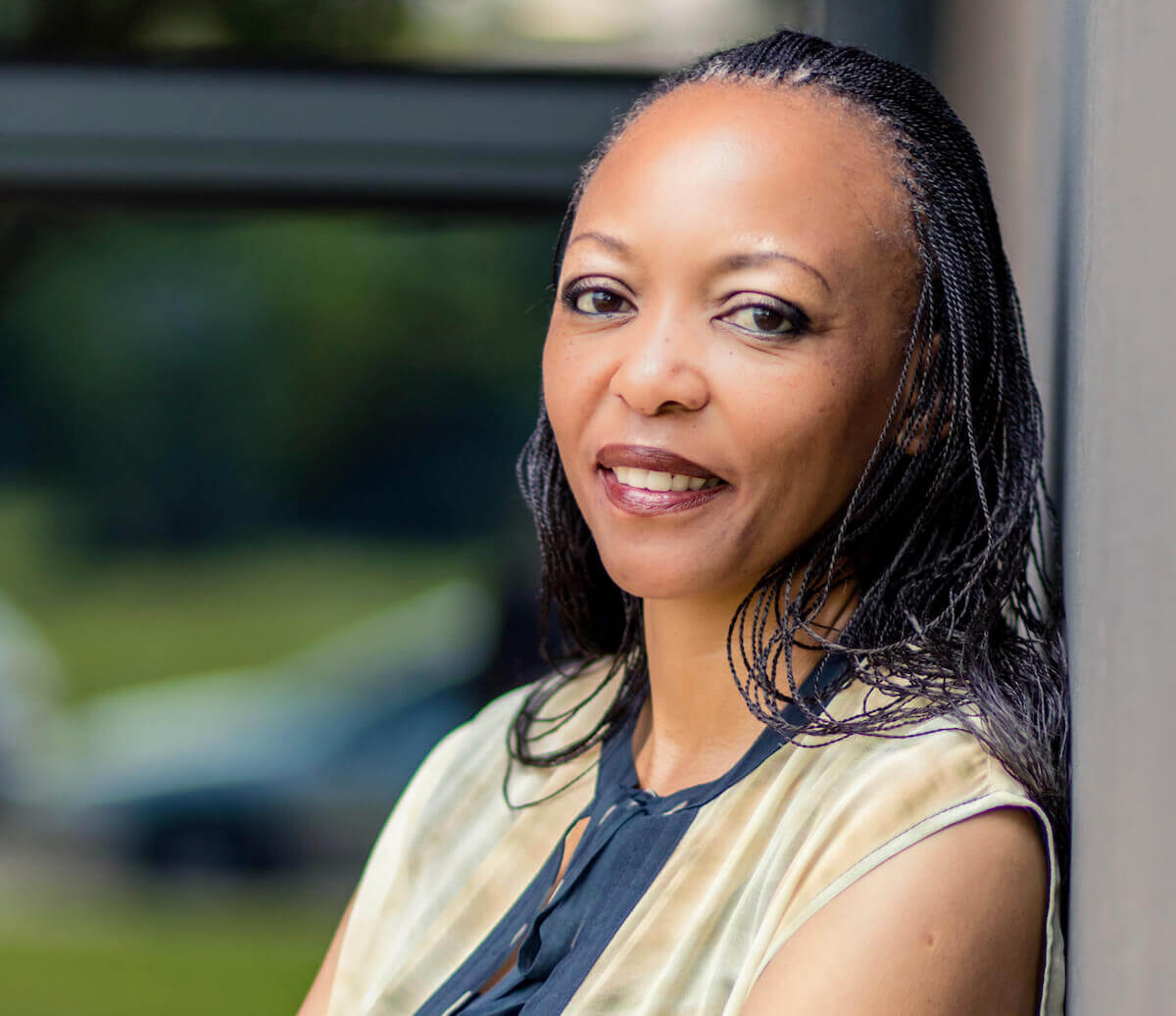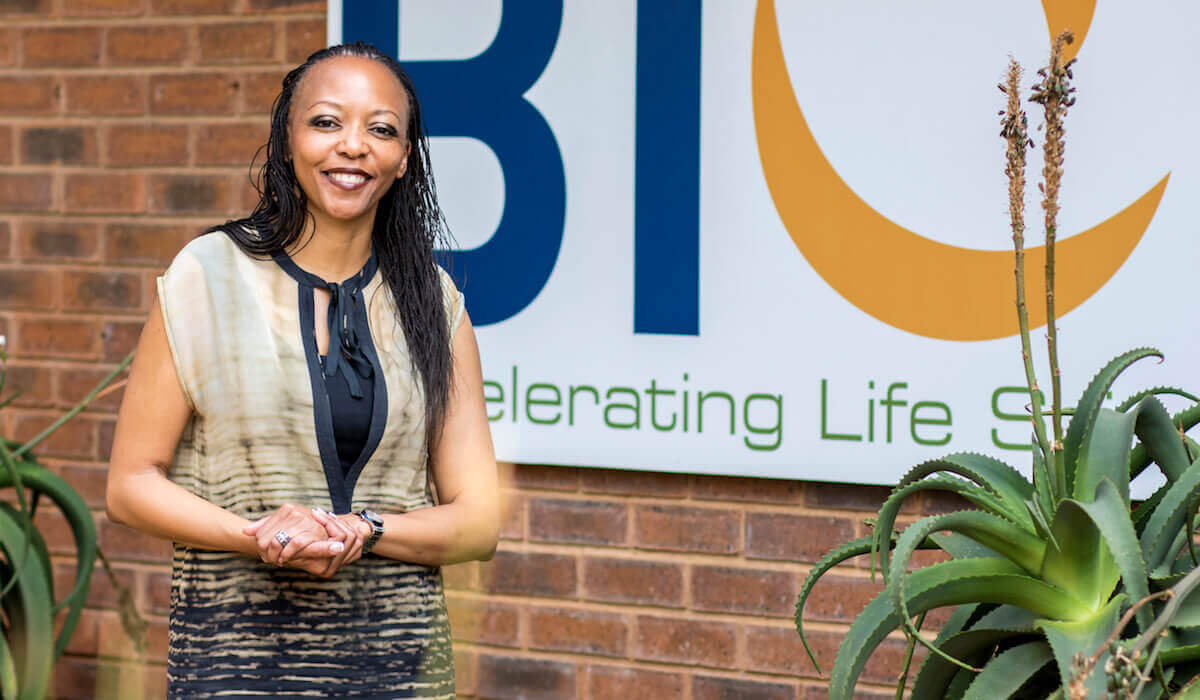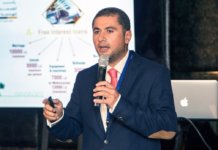Interview with Sibongile Gumbi, Founder of iVac Bio, South Africa
South African biotech CEO Dr Sibongile Gumbi finds herself in the dual role of being a scientific leader and entrepreneurial pioneer in her field. And yet, when she started her professional journey, she didn’t set out to achieve either of those distinctions. The fact that her company is successfully breaking new ground in Africa is a result of a genuine love of science and a desire to improve her community and the world at large. Her biotech company, iVac Bio, produces vaccines targeted at diseases transmitted from animals to humans. The pillars of the enterprise are innovation, manufacturing and partnerships.
This desire to give back to the community is rooted in her early education through the United World Colleges movement. Having attended both Waterford Kamhlaba in Swaziland and Pearson College in Canada, she was exposed to a unique educational experience shared with learners from over 70 countries and where community involvement along with academic excellence was emphasised. From here she went on to earn a PhD in Pharmacology from the University of Cape Town (UCT) as well as an EMBA and certificate in Managing Technology Enterprises both from the International Institute for Management Development in Switzerland.
Like many graduates in the field of science, her professional career began as a researcher but she soon discovered being confined to a laboratory wasn’t for her. Later she worked at the at the Council for Scientific and Industrial Research (CSIR) in South Africa where Dr Gumbi was responsible for the commercialisation of technologies that were generated from the Institution. In this role, she worked with researchers and was the bridge between the researchers and industry.
This broader perspective on how the science has a direct impact in the community would, in turn, lead her to branch out on her own and create iVac Bio. Tharawat Magazine had the opportunity to sit down with Dr Sibongile Gumbi and discuss the state of vaccine production in Africa, her emergence as a leader in her community and what the future has in store for iVac Bio.

Your career path has taken a somewhat unusual trajectory, going from a purely scientific career towards a corporate environment and finally resulting in entrepreneurship. Can you tell us which of these environments you are most comfortable in and what challenges each presents?
iVac Bio encompasses a little bit of my entire journey. I’m most happy and satisfied and passionate in the business environment where I feel I can make a direct impact on people’s lives, on the contribution to the economy, and demonstrate that we have the capability and capacity to actually achieve good things in Africa. But to be where I’m at today, my scientific training that I received has put me in good stead. Because science is about discipline. It’s about staying informed on issues. About researching to determine the truth. And those basic elements of scientific training I continue to use in business. I can’t afford not to be disciplined in how I manage my business. You may not necessarily know everything, but you need to make sure that you at least have enough knowledge and are comfortable with all facets of your company.
The only incongruence I can say that exists between my scientific beginnings and my business leadership, is that science, oddly enough, does not encourage you to take risks. And I’ve had to be comfortable in an environment where you are expected to take risks. And I quite enjoy that. I guess it’s that part of me that is curious. I like to push boundaries and want to see how far I can go. And so, risk-taking does not scare me.
Would you say your company is primarily a healthcare firm or a tech firm?
I would say, animal healthcare. The focus now is the development of vaccines for what are called zoonotic diseases. Zoonotic diseases are diseases that get transferred from animals to humans. In Africa, there are many animal diseases where either the health products available are not effective, or as effective as they could be. In some cases, they may not work as well in Africa because they have been conceived for conditions in developed countries. The impact of animal diseases on livestock farmers is tremendous on our continent. In Africa, you have more smallholder livestock farmers, who can’t absorb the economic knocks that animal diseases have on them. To me, it’s important that we start to look at developing and manufacturing vaccines that are affordable, effective, and safe. They should be relevant to the diseases that have a high impact on animal production in our countries. To demonstrate this, iVacBio is one of eight recipients of a global US $30 million competition aimed at incentivising the development of a vaccine that is efficacious, safe and viable for use against Brucella melitensis in small livestock across the developing world.

How has this industry evolved over the last few years? And what have been the most important changes that have led you to be able to have this impact with iVac Bio?
Today almost all animal health products in African countries are imported. This results in huge costs to individual livestock owners, and also to governments. And so, for the larger part, there has been limited access and limited availability of animal health products. So when a disease breaks out in a country – say, Foot and Mouth disease in a country like Botswana where cattle farming is an important contributor of that economy, your beef exports immediately face restrictions across the world. This impacts not only the farmer but the nation’s economy as well. The last outbreak of avian influenza in South Africa cost the country something like $9 million US dollars per month.
So that’s the situation we were faced with and that made me start iVac Bio. Also, we are now deploying emerging technology licensed from the USA and UK to manufacture the vaccines. It’s a technology called plant-based expression systems. So usually when you make a vaccine you’d use either yeast or bacteria or insect cells. The benefit of this plant-based technology is that it’s far cheaper because you’re using the plant as your factory as opposed to having to build huge bioreactors at a great cost. This brings down the cost of production and therefore, the price of the vaccine itself.
Do you see other companies emerging inside the animal healthcare industry?
In the animal health industry, I think most other players are involved more in the distribution rather than the production of animal health products. I think we’re pioneering at the moment. But new technologies will enable more and more people to get involved in the development and the production of animal health products. The magnitude of the problem is enormous. And there is no way that one company like iVac Bio will fulfil the demand of the entire potential market. There is certainly room for other players in other disease areas. The diseases iVac Bio currently focuses on include Avian Influenza, African Horse Sickness, Blue Tongue Virus and Brucellosis. There is also a good business case: I think being able to make money while also contributing to addressing the problem is what makes it so fulfilling.

This role as CEO and industry pioneer has thrust you into a position of leadership, both in the corporate structure and in the community. How have you grown into this leadership role?
I don’t refer to myself as a leader. I’m more of a doer than a leader. But by being a doer, I’ve become a leader. Pioneering in new areas automatically puts you into a leadership position. I think my leadership style is mostly defined by my conviction that you always have to do your very best. Striving for quality and having standards is key. Whether it’s a product of quality or how you conduct yourself as an individual or how you engage with other people. I’m very aware that all of this should be done to the highest possible standards.
In South Africa I feel that we need a kind of leadership that empowers people. When I was in the corporate environment, I used to say to my team “when I leave this position one of you must be ready to take over from me.” I would always try to find ways to help them grow. Also, given the South African context, and some of the socio-political challenges, it’s important to demonstrate ethical and moral qualities in your leadership.
I look at what’s happening in South Africa, and I find a lot of leaders are saying “what’s in it for me?” rather than “what’s good for the business?”. Yes, I’m running my own business, but it’s important that I don’t just focus on my own benefits. Because that doesn’t build companies, that doesn’t build people, and that doesn’t build society either.
[ms-protect-content id=”4069,4129″]
How has the current technological revolution affected leadership practices in your view?
I think the critical thing that the current technologies and related developments in the world have brought to my attention is that leadership is not just about age. Leadership is contextual irrespective of where you’re at. Maybe you find that you are a leader in your family. Or you are a leader of a global company, like Elon Musk. The global developments challenge us as leaders, because they challenge the traditional way that we’ve always thought of leadership. They also challenge the cultural way that we’ve thought of leadership. For example, in South Africa, you grow up in families where you always have to respect your elders. Now, you move into a work environment, and you carry that respect with you. But, it doesn’t mean that you need to be submissive. And that’s what sometimes is the challenge, as you move from one world into another.

You said you are already heavily investing in instilling a sense of culture that is based on ethics and values and giving back. What do you think are some things the business community needs to do to have more of that positive leadership emerge?
For me, it’s to be conscious of what type of a leader you are to your followers because they have entrusted their confidence in you as a leader. And so, it’s essential that you develop certain qualities that will work for you as a leader. The second thing I find is that our society penalises you for mistakes. I regret that because it then makes you into a leader who does not want to try things. Yes, recognise your error. Learn from it but don’t repeat it. If you learn from it and you grow from the experience then you become a better person.
As you look to the future, what is your greatest wish for iVac Bio? What kind of legacy do you want to leave?
Regarding iVac Bio and the future, I like the vision of ensuring that the core business remains in South Africa while growing into a globally recognised company. I want it to be a company that South Africa can be proud of, a positive story for us as a nation. To demonstrate that we have the capability, we have the capacity to grow global companies that benefit the country, and the whole continent.
[/ms-protect-content]














